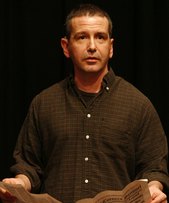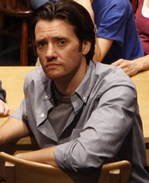SITE GUIDE
SEARCH
REVIEWS
REVIEW ARCHIVES
ADVERTISING AT CURTAINUP
FEATURES
NEWS
Etcetera and
Short Term Listings
LISTINGS
Broadway
Off-Broadway
NYC Restaurants
BOOKS and CDs
OTHER PLACES
Berkshires
London
California
New Jersey
Connecticut
DC
Philadelphia
Elsewhere
QUOTES
TKTS
PLAYWRIGHTS' ALBUMS
LETTERS TO EDITOR
FILM
LINKS
MISCELLANEOUS
Free Updates
Masthead
A CurtainUp Review
Our Town
By Elyse Sommer
|
Re-visiting Our Town at Barrow Street
Except for its original town manager, director David Cromer, the same cast members of this extraordinary production continue to roam the streets (in this case the Barrow Street Theater's aisles) of Grovers' Corner and fill their quiet cradle to grave lives with the mundane pleasures of the sort of small town life now pretty much a thing of the past. After the public's disappointing response to Cromer's attempt to bring his directorial vision to Neil Simon's Brighton Beach Memoirs, I was eager to revisit Our Town and see if it retained its magic even though it didn't boast a single celebrity in the cast. I'm pleased to report that it does, and that the house was packed with a diverse audience, including one young girl who couldn't have been more than 12, clearly enthralled to find herself surrounded by the actors. Actually, the new Town Manager, Jason Butler Harner, is a well-credentialed, seasoned actor of stage and screen though not a celebrity thespian, shades of Hugh Jackman and Daniel Craig. Harner brings youth and a good deal of charm to the role. He's a bit more actor-ish than Cromer, but that's fine-- the whole idea of this intimate production that never dims the lights to make the audience aware that this is a play that they're watching. The final scene is still tightened my throat. And brought the audience to its feet — a more deserved standing ovation than many a glossier plays (new or old) than you're likely to see on Broadway. My original review, below holds. . .with no need to substitute new names for the actors mentioned. |
—original review by
|
. . . Oh, earth, you are too wonderful for anybody to realize you. Do any human beings ever realize life while they live it—-every,every minute?— Emily, in the final speech that tugs at the heasrt strings no matter how often one has seen this play.
|

David Cromer, Our Town's director and Stage Manager
(Photo: Carol Rosegg) |
Since being awarded a Pulitzer in 1938 (one of three for Wilder) Our Town has become a standard for regional and high school theater. Consequently, the concerted wisdom tends to be that it either takes special star power (like Newman as Stage Manager) or a drastic departure from conventional casting (like Jack Cummings' casting of older actors as Emily and George and a teenager as the Stage Manager).
I suppose you could say that a certain amount of star dust has attached itself to David Cromer. The Chicago director created quite a buzz last year with his striking musical adaptation of Elmer Rice's Adding Machine and is slated to direct a Broadway revival of Neil Simon's Brighton Beach Memoirs and Broadway Bound. But what makes this Our Town compelling enough for another look, even if you've seen innumerable productions as well as the movie version, is that it's as close as you can get to actually feeling that you're not in a theater but right in Grover's Corners. It has a simplicity and immediacy that plays down the often too saccarine, over-idealized image of small towns and instead hones in on the inescapable beginnings and endings that make up life no matter where and when we live.
To accommodate, his vision of making the audience an integral part of Wilder's turn of the century New Hampshire town, Mr. Cromer has reconfigured the Barrow Street theater so that the audience surrounds the stage on three sides, with enough space between the side sections' first and second rows for actors to walk through them (and similarly use one of the aisles) as if they were Grover's Corners streets. This essentially puts those seated in the first row of each side on stage.
What's usually the back of this venue's audience section is now the upstage playing area where the town's tragic alcoholic misfit, Simon Stimson (Jonathan Mastro who also composed the mood-enhancing music), plays the piano for a church choir group. The black curtain serving as a wall ultimately opens up to terrifically dramatic effect.
The scenery consists of two tables, eight chairs— and the audience's imagination which is boosted by the Stage Manager, played by director Cromer. Dressed in jeans and tee shirt so he could easily be mistaken as an audience member, Cromer handles his acting assignment with naturalness and considerable wry humor.
By calling his narrator Stage Manager, Thornton Wilder clearly intended us to be aware that we're watching a play. Putting it on in a small theater and with the all-around-the stage seating arrangement makes us feel that we're not just watching a play, but part of its citizenry— either back with the early 20th Century Gibbses and Webbs, or as the descendants reflecting on their lives. To emphasize this absence of a fourth wall, in the scene revolving around a lecture on the town's history the questions usually called out by an actor planted in the audience are written down on slips of paper and handed by the Stage Manager to people seated in the front rows so that they do the asking. The audience at the performance I attended seemed to like this somewhat corny directorial touch which could run into a stumble if one of the randomly selected participants either balks at being pulled into the action, has a reason like an eye problem for rejecting this mini reading assignment, or takes it upon himself to ask his or her own question.
Given the thrust seating I initially found it somewhat disconcerting to have the lights stay on throughout the first two acts and caught myself watching the rest of the audience as much as the actors but after a bit it became clear that this is exactly the point since the lights up staging intensifies the sense of actors and audience being all of a piece. On the other hand, the extreme intimacy and actor-audience integration does make the stylized activities too distracting, especially the cooking chores performed with make-believe pots and pans and on non-existing stoves by Mrs. Gibbs (Lori Myers) and Mrs. Webb (Kati Brazda). While Wilder intended the play to be performed without kitchen sink realism, in a production that puts the actors within touching distance you tend to become too aware of this being stage business. However, this is a minor quibble that does not diminish the overall virtues of this refreshing and deeply satisfying production.
The actors playing the Gibbs and Webb families whose interwoven lives dominate the plot (if you can call a chronicle of lives retold and foretold a plot), are believable in their small town ordinariness. Jennifer Grace, who also played Emily in Chicago, breaks your heart as the smart girl who today would be class valedictorian and would not only insist that George (James McMenamin) go to college but that she herself would further her education.
The cast overall succeeds in bringing out the emotional nuances that individualize the various townspeople. The two fathers (Jeff Still as Dr. Gibbs and Ken Marks as Editor Webb) are standouts. Also very fine is Lori Myers as Mrs. Gibbs, a woman who diligently tends her chores but also dreams of going to Paris and for once being in a place where people speak a different language.
Of course Cromer can take just so much credit for the freshness and emotional richness of this production. Wilder's play has endured for seventy years because, he not only created such an indelible picture of what made small town American life both appealing and appalling. His script doesn't wait for the melancholy graveyard finale to point out the chinks in these people's armor (fear of leaving their boundaries, or encouraging their children to dream big dreams rather than become part of the chain of continuity). The director's achievement is in the way he makes us part of Grover's Corners and thus clarifies the universality of the need to seize each moment of life and to view Grover's Corners and its many long-gone prototypes in a more realistic, less mythology bathed light.
It's sad to think about how and why this way of life has almost completely vanished, yet it's also bracing to reflect that breaking the cradle-to-grave continuity in places like Grover's Corners, whether voluntarily or by necessity, has opened new vistas for youngsters like Emily and George. Still, with their heirs' big dreams shrunk by the dismal global economy, the American Dream may well need to need to once again revovle around the simple pleasures of watching the stars and the moon.
LINKS
Our Town with older actors as Emily and George
Our Town on Broadway, with Paul Newman as the Stage Manager
The Adding Machine
|
Our Town By Thornton Wilder Directed by David Cromer Cast (in alphabetical order): Elizabeth Audley (Citizen),Jeremy Beiler (Sam Craig), Rob Beitzel (Howie Newsome), Joy Besozzi (Citizen), Kati Brazda (Mrs. Webb), George Demas (Constable Warren), Donna Jay Fulks ( Mrs. Soames), Jennifer Grace (Emily), Wilbur Edwin Henry (Professor Willard), Adam Hinkle (Joe Crowell), Dana Elizabeth Jacks (Irma), Ronette Levenson (Rebecca Gibbs),James McMenamin (George), Jeff Still (Doc Gibbs), Ken Marks( Editor Webb), Jonathan Mastro (Simon Stimson), Seamus Mulcahy (Wally Webb), Lori Myers ( Mrs. Gibbs), Keith Perry (Farmer McCarty), Kathleen Pierce (Citizen), Jay Russell (Joe Stoddard), Mark Shock (Citizen),Jason Yachanin (Si Crowell) and David Cromer as the Stage Manager Scenic Design: Michele Spadaro Costume Design: Alison Siple Lighting Design: Heather Gilbert Original Music and Music Direction: Jonathan Mastro Stage Manager: Richard A. Hodge Running Time: 2 hours and 10 minutes, including 2 intermissions Jean Doumanian Productions and Barrow Street Theatre at Barrow Street Theatre 27 Barrow Street at 7th Avenue South barrowstreettheatre.com From 2/17/09; opening 2/26/09. Closing 9/12/10 Tuesday — Friday at 8 p.m., Saturday at 3 p.m. & 8 p.m., Sunday at 3 p.m. & 7 p.m. Reviewed by Elyse Sommer 2/23/09 |
|
REVIEW FEEDBACK Highlight one of the responses below and click "copy" or"CTRL+C"
Paste the highlighted text into the subject line (CTRL+ V): Feel free to add detailed comments in the body of the email. . .also the names and emails of any friends to whom you'd like us to forward a copy of this review. You can also contact us at Curtainup at Facebook or Curtainup at Twitter |
Wicked
Jersey Boys
The Little Mermaid
Lion King
Shrek The Musical

South Pacific

In the Heights

Playbill 2007-08 Yearbook

Leonard Maltin's 2008 Movie Guide



